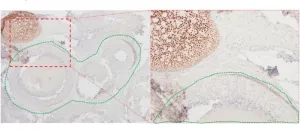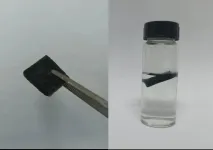(Press-News.org) Chestnut Hill, Mass. (08/01/2023 - Boston College Assistant Professor of Biology Emrah Altindis has received a two-year, $275,000-grant from the Beatson Foundation to explore the role of gut microbes and viruses triggering the autoimmunity of Type 1 diabetes.
“Our lab is extremely grateful for the generous funding bestowed upon us by the Beatson Foundation,” Altindis said. “The receipt of this grant has evoked a profound sense of both excitement and gratitude within our team. We recognize the significant impact this funding will have on our research endeavors, particularly in the field of Type 1 Diabetes.”
Funding for the project, titled “Determine the Role of Microbiota-Derived Insulin Epitope Mimics in Type 1 Diabetes Onset,” will support the Altindis lab’s effort to advance investigations on the potential link between gut microbes and Type 1 Diabetes, leading to a better understanding of the complex disease and potentially opening new avenues for therapeutic interventions including prevention, Altindis said.
Type 1 Diabetes (T1D) is a condition where the body mistakenly attacks and destroys cells that produce insulin, resulting in high blood sugar levels, Altinidis explained. Currently, there is no cure or effective way to prevent T1D. Altindis’s research focuses on understanding why T1D occurs and finding potential ways to treat or prevent it.
“We suspect that a protein similar to insulin, found in certain bacteria that reside in the human gut, may be triggering the onset of T1D,” Altindis said. “Specifically, we are interested in a small part of the insulin protein called insB:9-23. We have discovered a similar peptide called hprt4-18 in a bacterium called Parabacteroides distasonis, which is commonly found in the human gut.”
In previous studies, Altindis and his team have found that immune cells that target insB:9-23 cannot distinguish between the insB:9-23 peptide and the hprt4-18 peptide. When the researchers immunized mice with hprt4-18, their immune cells attacked insB:9-23, showing that T-cells (a type of immune cell) cannot tell the difference between the two. Additionally, when the researchers introduced Parabacteroides distasonis into the gut of mice that are commonly used in T1D research, they observed that T1D developed more quickly and there was increased inflammation.
Further analyzing data from children with T1D, Altindis and his team found a significant connection between the presence of the hprt4-18 peptide in their gut and their risk of developing T1D.
“Building on our previous work, we aim to investigate further whether hprt4-18 derived from the gut microbiota is a cause of T1D,” he said. “Our next steps involve creating a version of the bacteria without hprt4-18 and studying its impact on T1D in different mouse models. We will also use innovative sequencing methods and unique human samples to study how this bacterium affects the human immune response. Lastly, we will examine the presence of immune cells specific to hprt4-18 in both T1D patients and healthy individuals.”
Altindis hopes this study will help establish a connection between the gut microbiome and T1D, potentially leading to new therapies for the prevention or cure of T1D.
“Our goal is to expand our understanding of T1D and explore new ways to treat or prevent this condition,” Altindis said.
“I would like to express my deep gratitude to the members of my laboratory who have played instrumental roles in the progress of this project,” Altindis said. “In particular, I extend my appreciation to Dr. Khyati Girdhar and Dr. Qian Huang for their valuable contributions and expertise. Furthermore, I would like to acknowledge the efforts of my graduate students, Audrey Randall, Dogus Dogru, and Katherine Truelson. The collaborative spirit and collective contributions of these individuals have been instrumental in driving the success of this project. Lastly, I would like to thank our collaborators who have supported this project. We are truly honored and appreciative of the Beatson Foundation's recognition and endorsement of our work.”
END
Beatson Foundation awards grant to Boston College biologist Emrah Altindis for Type 1 diabetes research
Project advances the Altindis lab’s investigations into the potential link between gut microbes and Type 1 diabetes
2023-08-01
ELSE PRESS RELEASES FROM THIS DATE:
North Atlantic Oscillation contributes to ‘cold blob' in Atlantic Ocean
2023-08-01
UNIVERSITY PARK, Pa. — A patch of ocean in the North Atlantic is stubbornly cooling while much of the planet warms. This anomaly — dubbed the "cold blob" — has been linked to changes in ocean circulation, but a new study found changes in large-scale atmospheric patterns may play an equally important role, according to an international research team led by Penn State.
“People often think the atmosphere has a very short memory, but here we provide evidence that atmospheric circulation change is significant enough to induce some long-term impact on the climate system,” ...
MSU leads Office of Naval Research grant to make AI more reliable and transparent
2023-08-01
Highlights:
Michigan State University researchers are leading a $1.8 million grant project funded by the Office of Naval Research to evolve artificial intelligence.
The research would make it possible to use AI more reliably for tasks we already accomplish with help from popular AI tools like ChatGPT. It could also enable people to entrust AI systems with more advanced jobs that rely on understanding language and visual information, including education, navigation and multimodal question-answering systems.
The team is working to connect “classical” or symbolic AI with current deep neural networks and create a neuro-symbolic framework. ...
Multiclonality of estrogen receptor expression in ductal carcinoma in situ (DCIS)
2023-08-01
“We have discussed in detail the clinical implications of ER in avoiding overtreatment and undertreatment in DCIS.”
BUFFALO, NY- August 1, 2023 – A new editorial paper was published in Oncotarget's Volume 14 on July 20, 2023, entitled, “Multiclonality of ER expression in DCIS – Implications for clinical practice and future research.”
Estrogen receptor (ER) expression is not routinely evaluated in ductal carcinoma in situ (DCIS). This may be because the prognostic role of ER in DCIS was unclear until the UK/ ANZ DCIS trial in 2021 showed that lack of ER expression in DCIS was associated with a greater than 3-fold risk of ipsilateral recurrence. This ...
Score, then rank: Researchers propose an integrated approach to grant review assessments
2023-08-01
The public funding of science is responsible for many of the biomedical and other scientific breakthroughs on which our lives depend. However, the process through which funding decisions are made, the peer review of grant proposals, has been historically understudied, and current approaches can lead to undesirable outcomes. Writing in Research Integrity and Peer Review, Stephen A. Gallo, then affiliated with the American Institute of Biological Sciences, and Michael Pearce, Carole J. Lee, and Elena A. Erosheva from the University of ...
A floating sponge could help remove harmful algal blooms
2023-08-01
In the peak heat of summer, beachgoers don’t want their plans thwarted by harmful algal blooms (HABs). But current methods to remove or kill toxin-producing algae and cyanobacteria aren’t efficient or practical for direct applications in waterways. Now, researchers reporting in ACS ES&T Water have coated a floating sponge in a charcoal-like powder, and when paired with an oxidizing agent, the technique destroyed over 85% of algal cells from lake and river water samples.
Swaths of electric green and bright orange-red HABs, or the less brilliantly colored cyanobacteria Microcystis aeruginosa, can produce toxins that can sicken humans ...
Early-life lead exposure linked to higher risk of criminal behavior in adulthood
2023-08-01
An evaluation of 17 previously published studies suggests that exposure to lead in the womb or in childhood is associated with an increased risk of engaging in criminal behavior in adulthood—but more evidence is needed to strengthen understanding. Maria Jose Talayero Schettino of the George Washington University, U.S., and colleagues present these findings in the open-access journal PLOS Global Public Health.
Lead exposure can cause a variety of health challenges, such as cardiac issues, kidney ...
Organoids revolutionize research on respiratory infections
2023-08-01
Biofilms are highly resistant communities of bacteria that pose a major challenge in the treatment of infections. While studying biofilm formation in laboratory conditions has been extensively conducted, understanding their development in the complex environment of the human respiratory tract has remained elusive.
A team of researchers led by Alexandre Persat at EPFL have now cracked the problem by successfully developing organoids called AirGels. Organoids are miniature, self-organized 3D tissues grown from stem cells to mimic actual body tissues and organs in the human body. They represent ...
The key to battling a pathogen hides in its genome
2023-08-01
Many of the answers for effectively responding to a pathogen lie in its genome. Understanding the genetic code of a pathogen like Ebola or the virus that causes COVID-19 allows scientists to track its movement, predict future behavior, identify the source of the outbreak and, most importantly, develop effective vaccines and treatments. This technology was critical during the pandemic, and it will be even more so with future outbreaks.
That makes the continued development of genomic sequencing one of the most ...
Scientists develop breath test that rapidly detects COVID-19 virus
2023-08-01
Scientists at Washington University in St. Louis have developed a breath test that quickly identifies those who are infected with the virus that causes COVID-19. The device requires only one or two breaths and provides results in less than a minute.
The study is available online in the journal ACS Sensors. The same group of researchers recently published a paper in the journal Nature Communications about an air monitor they had built to detect airborne SARS-CoV-2 — the virus that causes COVID-19 — within about ...
Sex pheromone of moths is a precise mix of ingredients
2023-08-01
Researchers from the UvA and North Carolina State University have identified the specific mixture of pheromone chemicals that male moths use during courtship. The findings provide more detail about the complex blend of chemicals that males and females of this group of moths use in fundamental short-range communication. The publication in the scientific journal Current Biology appeared on 1 August.
Scent compounds are essential for male moths to entice female conspecifics to mate. Both partners need to find and recognize each other in the dark. This is done by sex pheromones secreted by the female. Then it is up to the male to convince the female ...
LAST 30 PRESS RELEASES:
Roadmap for Europe’s biodiversity monitoring system
Novel camel antimicrobial peptides show promise against drug-resistant bacteria
Scientists discover why we know when to stop scratching an itch
A hidden reason inner ear cells die – and what it means for preventing hearing loss
Researchers discover how tuberculosis bacteria use a “stealth” mechanism to evade the immune system
New microscopy technique lets scientists see cells in unprecedented detail and color
Sometimes less is more: Scientists rethink how to pack medicine into tiny delivery capsules
Scientists build low-cost microscope to study living cells in zero gravity
The Biophysical Journal names Denis V. Titov the 2025 Paper of the Year-Early Career Investigator awardee
Scientists show how your body senses cold—and why menthol feels cool
Scientists deliver new molecule for getting DNA into cells
Study reveals insights about brain regions linked to OCD, informing potential treatments
Does ocean saltiness influence El Niño?
2026 Young Investigators: ONR celebrates new talent tackling warfighter challenges
Genetics help explain who gets the ‘telltale tingle’ from music, art and literature
Many Americans misunderstand medical aid in dying laws
Researchers publish landmark infectious disease study in ‘Science’
New NSF award supports innovative role-playing game approach to strengthening research security in academia
Kumar named to ACMA Emerging Leaders Program for 2026
AI language models could transform aquatic environmental risk assessment
New isotope tools reveal hidden pathways reshaping the global nitrogen cycle
Study reveals how antibiotic structure controls removal from water using biochar
Why chronic pain lasts longer in women: Immune cells offer clues
Toxic exposure creates epigenetic disease risk over 20 generations
More time spent on social media linked to steroid use intentions among boys and men
New study suggests a “kick it while it’s down” approach to cancer treatment could improve cure rates
Milken Institute, Ann Theodore Foundation launch new grant to support clinical trial for potential sarcoidosis treatment
New strategies boost effectiveness of CAR-NK therapy against cancer
Study: Adolescent cannabis use linked to doubling risk of psychotic and bipolar disorders
Invisible harms: drug-related deaths spike after hurricanes and tropical storms
[Press-News.org] Beatson Foundation awards grant to Boston College biologist Emrah Altindis for Type 1 diabetes researchProject advances the Altindis lab’s investigations into the potential link between gut microbes and Type 1 diabetes





